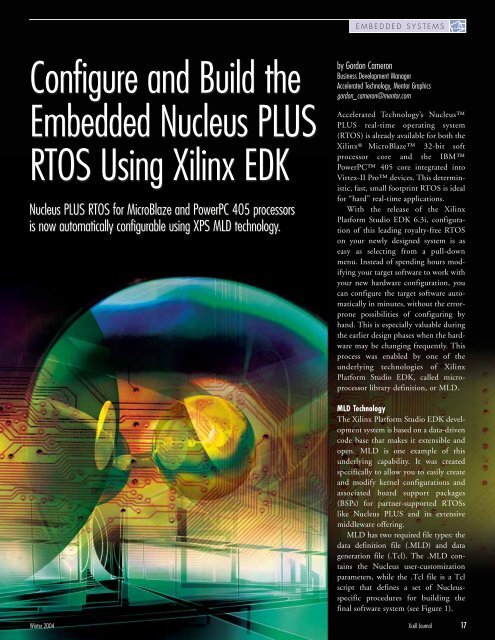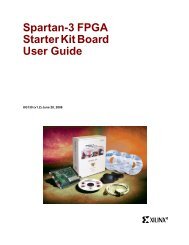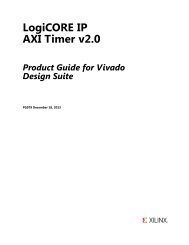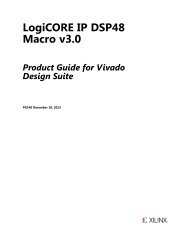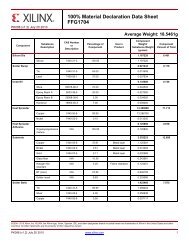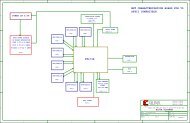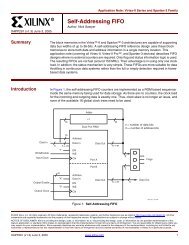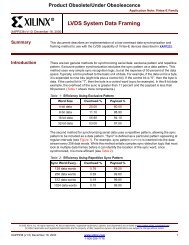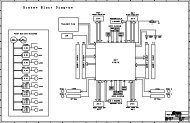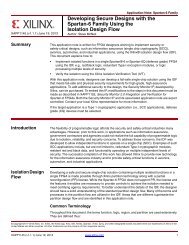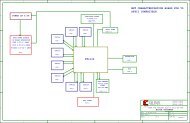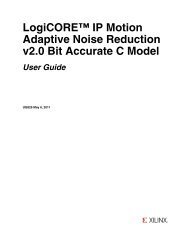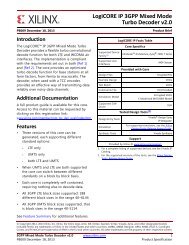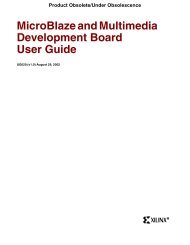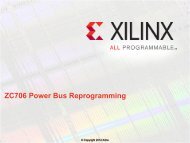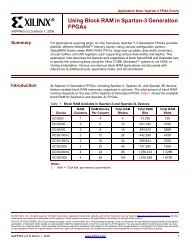Xcell Journal: The authoritative journal for programmable ... - Xilinx
Xcell Journal: The authoritative journal for programmable ... - Xilinx
Xcell Journal: The authoritative journal for programmable ... - Xilinx
Create successful ePaper yourself
Turn your PDF publications into a flip-book with our unique Google optimized e-Paper software.
Configure and Build the<br />
Embedded Nucleus PLUS<br />
RTOS Using <strong>Xilinx</strong> EDK<br />
Nucleus PLUS RTOS <strong>for</strong> MicroBlaze and PowerPC 405 processors<br />
is now automatically configurable using XPS MLD technology.<br />
EMBEDDED SYSTEMS<br />
by Gordon Cameron<br />
Business Development Manager<br />
Accelerated Technology, Mentor Graphics<br />
gordon_cameron@mentor.com<br />
Accelerated Technology’s Nucleus<br />
PLUS real-time operating system<br />
(RTOS) is already available <strong>for</strong> both the<br />
<strong>Xilinx</strong> ® MicroBlaze 32-bit soft<br />
processor core and the IBM<br />
PowerPC 405 core integrated into<br />
Virtex-II Pro devices. This deterministic,<br />
fast, small footprint RTOS is ideal<br />
<strong>for</strong> “hard” real-time applications.<br />
With the release of the <strong>Xilinx</strong><br />
Plat<strong>for</strong>m Studio EDK 6.3i, configuration<br />
of this leading royalty-free RTOS<br />
on your newly designed system is as<br />
easy as selecting from a pull-down<br />
menu. Instead of spending hours modifying<br />
your target software to work with<br />
your new hardware configuration, you<br />
can configure the target software automatically<br />
in minutes, without the errorprone<br />
possibilities of configuring by<br />
hand. This is especially valuable during<br />
the earlier design phases when the hardware<br />
may be changing frequently. This<br />
process was enabled by one of the<br />
underlying technologies of <strong>Xilinx</strong><br />
Plat<strong>for</strong>m Studio EDK, called microprocessor<br />
library definition, or MLD.<br />
MLD Technology<br />
<strong>The</strong> <strong>Xilinx</strong> Plat<strong>for</strong>m Studio EDK development<br />
system is based on a data-driven<br />
code base that makes it extensible and<br />
open. MLD is one example of this<br />
underlying capability. It was created<br />
specifically to allow you to easily create<br />
and modify kernel configurations and<br />
associated board support packages<br />
(BSPs) <strong>for</strong> partner-supported RTOSs<br />
like Nucleus PLUS and its extensive<br />
middleware offering.<br />
MLD has two required file types: the<br />
data definition file (.MLD) and data<br />
generation file (.Tcl). <strong>The</strong> .MLD contains<br />
the Nucleus user-customization<br />
parameters, while the .Tcl file is a Tcl<br />
script that defines a set of Nucleusspecific<br />
procedures <strong>for</strong> building the<br />
final software system (see Figure 1).<br />
Winter 2004 <strong>Xcell</strong> <strong>Journal</strong> 17


